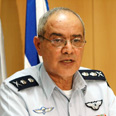
Halutz: I'll quit if told by inquiry commission
In press conference, army chief addresses inquiries, conclusions and lessons, elaborates on mistakes made by IDF's top brass during war in Lebanon. 'I do not belittle failures, but there were also many accomplishments,' he says
"I did not hear my superiors calling on me to quit, and when they tell me to, I will answer them," he said.
Halutz, however, referred to the Winograd commission of inquiry report, which is scheduled to be issued in February, noting that if the committee says anything different, he will do what he is told "because it's obligating."
"I chose to take responsibility," Lieutenant General Halutz said. "There are those who interpret responsibility as running away. I chose to deal with the inquiry and with what needs fixing. That is what responsibility is about."
As for the inquiries, Halutz added that "the fighting in Lebanon raised problems and failures, alongside many successes. I do not belittle the failures, but there were also many accomplishments."
Halutz noted that the war's objectives must be addressed, and reviewed the objectives, including the creation of conditions for the return of the kidnapped soldiers and strengthening the Israeli deterrence.
According to Halutz, it is still too early to address the issue of deterrence, as only a short period of time has passed since the war ended.
He also noted that one of the main mistakes the IDF's top brass made was "acting as if it were a routine security operation rather than a war."
Like a routine operation
According to Halutz, the war's accomplishments were manifested in the damage caused to long-range and medium-range rockets, as well as the harm caused to Hizbullah's status and the removal of its fighters from the border.
He added, however, that "we didn’t succeed in halting the short-range rocket fire until the ceasefire, in spite of the damage caused to infrastructures and storerooms."

Halutz presents inquiry, Tuesday evening (Photo: Niv Calderon)
The army chief reviewed the main mistakes made by the IDF's top brass during the war: Halting the Katyusha fire was not defined as the first mission from the outset of the war and the commands should have been clearer; there was a need to prepare for a ground operation soon; there was a lack of dialogue with the Northern Command; the army acted as if it were a routine security operation rather than a war.
Halutz added that Dan Shomron's inquiry revealed that the war's objectives were not defined in a sharp and clear military language, and the operational headquarters' work was insufficient.
Halutz pointed to incidents in which the army deviated from the value of "sticking to the mission in light of the objective."
"There were cases in which commanders did not stick to the objective and even doubted the objective, as well as failures in initiative and in taking responsibility," he said.
He added, however, that there were many remarkable incidents in which injured soldiers were evacuated under fire.
As part of the lessons, the chief of staff mentioned the training revolution, which is a great part of the implementation of the lessons. According to him, a change will take place in the process of manning commanders for reserve units, as well as in strengthening the reserve lineup.
"We need this lineup, and in recent years it has not received the appropriate attention," he noted.
Halutz also referred to those who already paid the price of the failures: "I did not do a thing to hurt them, not Udi Adam and not Gal Hirsch. These are not my characteristics."










